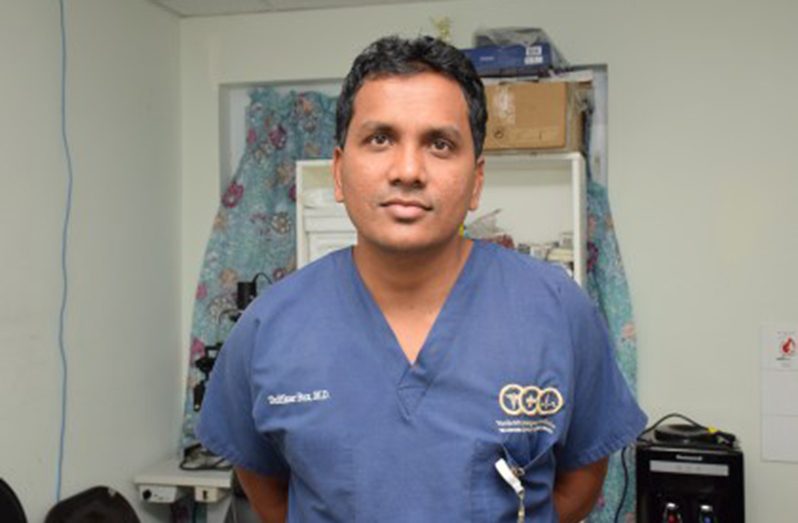By Rehana Ahamad
APPROXIMATELY 75 Emergency Medical Technicians (EMTs) are currently operating under the medical licence of Dr. Zulfikar Bux, founder and Director of Guyana’s pioneer Emergency Medical Services (EMS).
This means that Dr. Bux is answerable to any legal matters that may arise in relation to the work of EMTs.
“My licence covers their work, so every legal matter, I will have to defend; being the medical director, they are working under my licence as a physician,” Dr. Bux confirmed.
He said that the landmark EMS legislation, which is currently being drafted, intends to bring resolution to a number of issues, including the issuance and revocation of licences for first responders. The legislation, according to Dr. Bux, would require the implementation of a comprehensive and legally established process, accompanied by specific criteria, etc.
“The EMTs cannot continue to function under a medical doctor’s licence. Having legislation in place, they would be certified to execute their functions; they would have their own autonomy. Not to just work in the public system, but it will give them the freedom to also collaborate and work with other healthcare providers as well,” Dr. Bux posited.
The EMS Director revealed that the draft legislation will also address concerns of malpractices and disciplinary actions in the case of negligent first responders.
“There will likely have EMTs who will have malpractice issues, but there isn’t a way to address it right now,” Dr. Bux noted.
He drew reference to the fact that matters of physician negligence are independently dealt with at the level of the Guyana Medical Council, while issues pertaining to the EMTs are often unanimously and single-handedly addressed by one person, without a proper legal framework.
“The EMTs are dealt with by a regular system through the fire service, or me making a decision based on what is best in medicine, but it should not be an individual, dependent decision-making process,” Dr. Bux said, specifying that the legislation will comprise of a system that is “defensible to both the person making the [disciplinary] decision and the person who is receiving remediation.”
The document, once tabled and approved by the National Assembly, will also give rights to both members of the public as well as the EMTs, in cases of complaints.
“We want to have some amount of legal coverage for what we’re doing…the more people we transport, the more amount of intricacies you would find happening, and we want to have some amount of legal coverage,” Dr. Bux said.
Because the provision of Emergency Medical Services is new to Guyana, there are currently no laws that govern how patients are transported from their home to the hospital, or how to deal with a host of problems that are likely to arise during transport. More specifically, the EMS legislation is expected to provide guidance relating to the conduct of EMTs in cases where patients are refusing medical interventions.
“We don’t have any legislation to say that it is okay to leave a man who is dying, because he says he wants to be left that way,” Dr. Bux highlighted.
He said that the EMS legislation will also serve as a tool to ensure the protection of first responders, who often face abuse by members of the public.
“There are people who are abusive to EMTs while they tend to patients at a scene, and right now there is no protection in legislation to cover the EMTs when they go on the scene,” Dr. Bux said.
He added, “We had case recently, actually, where the EMTs arrive on the scene and the person was dead, and the family wanted transport so they called the ambulance to transport, but persons got aggressive after the EMTs decided to retract and leave.”
Dr. Bux explained, “The law is, once a person is dead, EMTs are not supposed to transport that person to the hospital; they have to get the police involved to certify and see whether it was a case of homicide or any issues with the dead itself,” Bux added, as he emphasised the need for early implementation of the important legislation.
“We need documents to show that if X happens, this is how you respond or this is what you do and this is what you are not supposed to do and so on. The only legislation that Guyana has really caters for in-hospital patient care.”
Dr. Bux is optimistic that the laws would be in place by year end, to cater for the notable 2021 expansion slated for the Emergency Medical Service. “I am looking forward to the support to make sure it happens so that we can continue our expansion in a more efficient way.”



.jpg)








